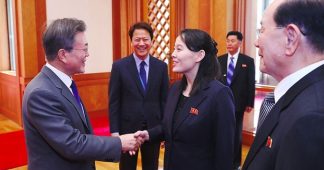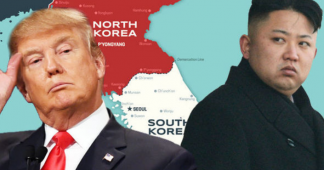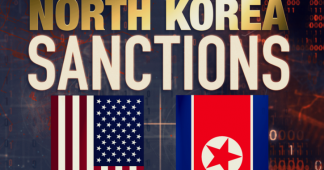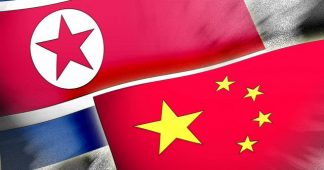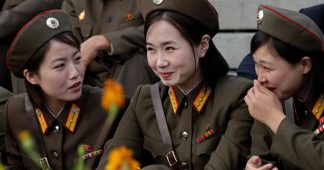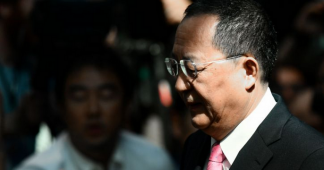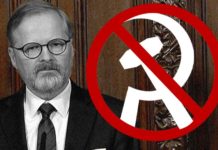02.03.2018
Dr. Loretta Napoleoni is an internationally esteemed expert on terrorism financing and the war on Daesh. Now, she has focused her attentions on North Korea – and as with her previous groundbreaking work, she has identified a vast gulf between mainstream news reporting and reality. Speaking exclusively to Sputnik, she outlines her key findings.
If Western media reporting is anything to go by, North Korea is variously a paranoid, backward, rogue state basket case, that poses a threat to civilization. However, few experts see things that way — among them is Dr. Loretta Napoleoni. Her view radically diverges from the mainstream — she sees the country as a fast-developing nation eager to engage with the outside world, not merely as an integrated member of the global economy, but a regional if not international power in its own right.
“Media coverage of developments in North Korea has been terrible. Journalists apparently have no idea about the region’s history, or its political dynamics today. Most Western politicians seem to be in the dark too. Just about the only leader to see sense is [South Korean President] Moon Jae In. Kim Jong-un has masterfully gamed things to his advantage — today, internationally and domestically, Pyongyang is in a stronger position now than ever before,” Dr. Napoleoni told Sputnik.
North Korea starts 2018 subject to a vast number of sanctions, and the rhetoric issuing from Washington, London and other key centers of Western power is the most incendiary and negative imaginable. However, Dr. Napoleoni believes the year will be a pivotal moment for North Korea, and a key phase in a wider long-term geopolitical shift towards a truly multi-polar world.
The Millennial Man
The crucial factor behind this irresistible rise has been the rule of Kim Jong-un, the academic argues. While the Western media made much of his youth and inexperience upon his assumption of power in 2011, she believes he has distinguished himself ever since as an extremely skilful politician, exhibiting “very high” degrees of sophistication along the way.
“He’s pragmatic, and has a distinct vision of the world, very different from his predecessors. Unlike Kim Il-sung who fought colonialism or Kim Jong-il who grew up during the Cold War, Kim Jong-un is a millennial — he understands globalization and knows it’s increasingly difficult to keep the world at bay, while also sensing the traditional East/West Cold War dichotomy is no longer viable either. To survive, North Korea must grow economically, and this has been his message since the beginning,” Dr. Napoleoni notes.
Economic progress is certainly foot Korea. According to the Central Bank of South Korea, in 2016 the country’s GDP expanded 3.9 percent, driven primarily by the mining and energy sectors — the highest rate of growth in seventeen years. Despite this, Pyongyang doesn’t have a unified vision or plan in this regard — instead, Jong-un has updated the country’s ‘juche’ philosophy of self-reliance for the 21st century, tolerating ever-increasing economic liberalization, and allowing ordinary citizens to forge their own financial futures.
Of course, Dr. Napoleoni observes, the central government could crack down on some or all of the informal, small-scale markets that have emerged at any time — but a similarly improvisational approach to economic management, eschewing central planning, has also insulated the country from major crises previously, such as the implosion of the Soviet Union in 1991.
“History tells us the Chinese system, unlike the Soviet one, was sufficiently flexible to reform. The key question is whether Pyongyang will follow in Beijing’s footsteps, or Moscow’s? I’m confident North Korea will take the former path, one way or another — they’ve shown a tremendous capacity for adapting to new circumstances in the past,” Dr. Napoleoni told Sputnik.
Moreover, she observes Jong-un has broken with his forebears by placing women — his wife Ri Sol Ju and sister Kim Yo Jong — at the forefront of his government, and demonstrated a clear willingness to act independently — and indeed contrary to the wishes — of the country’s largest and oldest ally, China. North Korea under Jong-un stands primed to pursue policies in its own interest, unbeholden to any major power.
Profits of Doom
To Dr. Napoleoni’s mind, North Korea’s “very public” nuclear tests over 2017 have been crucial in enabling such autonomy. Previously, some Western ‘experts’ expressed doubt as to whether the country actually had such a capability — that’s not up for question any more. North Korea is today a fully-fledged nuclear power.
“Jong-un obviously has no interest in a first-strike — he merely wants to be left alone, which Western powers would be wise to do. Unless they’re willing to engage in a civilization-ending nuclear war with Pyongyang, which they’re not of course, the country’s survival in its present form is assured. Leaders must accept this, engage with North Korea diplomatically, and end the pointless sanctions. They’re not going to lead to Jong-un’s downfall, just feed anti-Western sentiment,” Dr. Napoleoni told Sputnik.
However, the country’s nuclear capabilities could conversely prove to be an obstacle to its developmental ambitions. In response to the perceived North Korean threat, Japanese premier Shinzo Abe has scrapped Article 9 of his country’s constitution, which since 1947 has outlawed war as a means to settle international disputes and placed strict limits on military spending, in order to remilitarize.
American President Donald Trump has also taken a consistently hard and hawkish line on Pyongyang. In response to North Korea’s missile threats, in August 2017 he promised to rain down “fire and fury like the world has never seen” on Pyongyang if Jong-un continued to “threaten” the US, imposing increased sanctions and redesignating the country as a state sponsor of terrorism.
If North Korea remains subject to such hostility, its international ostracision could well endure, and Jong-un’s modernizing aspirations may be dashed. However, Dr. Napoleoni believes there are already signs this unsympathetic milieu is thawing.
“The US is inflating the threat of North Korea in order to maintain its foothold in the Asia-Pacific and boost its weapons sales there — the country’s grip in the region is weakening all the time as China increasingly becomes a major military power, and when China eclipses the US in that field their position there will be untenable. The US knows this. Japan is yet to accept it’s not a power of any significance in the region anymore though. By contrast, Moon Jae In has initiated dialog with Jong-un which has already borne positive results,” she explains.
Friends Old and New
The 2018 Winter Olympics produced an unprecedented sight — athletes from both states competing in certain tournaments under the name ‘Korea’ — and a unified flag. The event also saw Kim Yo Jong extend a personal invitation to Jae-in to visit Pyongyang, to which the President responded positively — a special envoy will be sent to the North Korean capital. If the visit is successful, Jae-in may soon follow himself.
The warming relations between Seoul and Pyongyang are notable not merely because the two countries are effectively still at war. The US also cleared the way for increased arms sales to South Korea in the wake of Pyongyang’s nuclear tests — but it is apparently not an offer Seoul will be accepting.
READ MORE: Married to Kim: What We Might Know About North Korea’s First Lady
Dr. Napoleoni believes the decreasing tensions and increasing diplomacy between the two countries is symptomatic of South Korea’s acceptance of the certainty of North Korea’s emergence into the wider world — or, at least, North Korea isn’t going to give up its nuclear weapons as long as the West desires regime change in Pyongyang.
“Russian President Vladimir Putin understands North Koreans very well. At a September 2017 meeting with President Xi in Xiamen, China, he stressed sanctions were useless and ineffective and citizens would eat grass rather than abandon their nuclear program. If the international community genuinely wants North Korea to become internationally integrated, they should encourage economic development,” Dr. Napoleoni told Sputnik.
How long this process will take is, of course, uncertain. Nonetheless, if the pace of change is too sluggish, and the sanctions’ impact too deleterious, the academic suggests North Korea will not hesitate to engage in illegal activities to stay afloat, such as the production and sale of illicit drugs, and the sale of counterfeit currency.
Evidently, one way or another, North Korea is not going to be an impoverished, retrograde state much longer — and a refusal by Western leaders to facilitate this via conventional, legitimate means will only push the country deeper into the international black market.
READ MORE: US Cybersecurity Agency Accuses North Korea of Cryptocurrency Cyber Heist
“International trade in crystal meth or methamphetamine, for example, is worth several billion dollars annually. Currently, the biggest producer is Myanmar, but North Korea could easily rival such output. The state could conduct its illicit business activities via the dark net, using cryptocurrencies such as Bitcoin. North Korea is already ensconced in cryptocurrencies and there’ve been several reports it uses this digital cash to circumvent sanctions — for example, by clearing import-export activities, such as selling arms and buying oil from Iran or Libya,” Dr. Napoleoni concludes.
Published at https://sputniknews.com/analysis/201803021062166494-north-korea-loretta-napoleoni/
